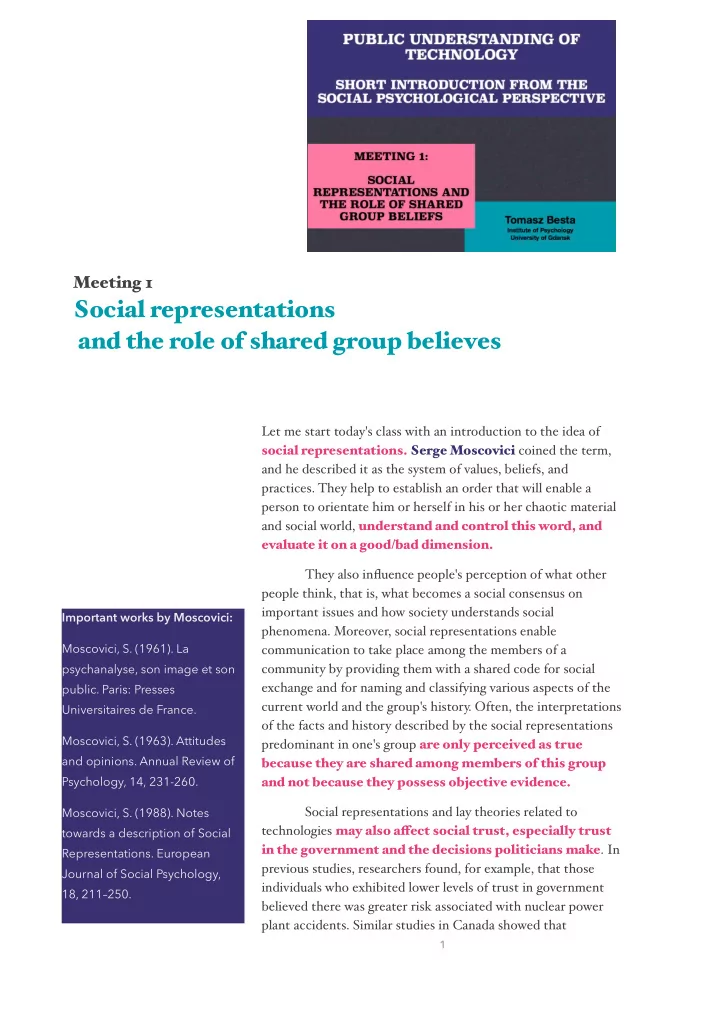

Meeting 1 Social representations and the role of shared group believes Let me start today's class with an introduction to the idea of social representations. Serge Moscovici coined the term, and he described it as the system of values, beliefs, and practices. They help to establish an order that will enable a person to orientate him or herself in his or her chaotic material and social world, understand and control this word, and evaluate it on a good/bad dimension. They also influence people's perception of what other people think, that is, what becomes a social consensus on important issues and how society understands social Important works by Moscovici: phenomena. Moreover, social representations enable Moscovici, S. (1961). La communication to take place among the members of a psychanalyse, son image et son community by providing them with a shared code for social public. Paris: Presses exchange and for naming and classifying various aspects of the Universitaires de France. current world and the group's history. Often, the interpretations of the facts and history described by the social representations Moscovici, S. (1963). Attitudes predominant in one's group are only perceived as true and opinions. Annual Review of because they are shared among members of this group Psychology, 14, 231-260. and not because they possess objective evidence. Moscovici, S. (1988). Notes Social representations and lay theories related to towards a description of Social technologies may also a fg ect social trust, especially trust in the government and the decisions politicians make . In Representations. European previous studies, researchers found, for example, that those Journal of Social Psychology, individuals who exhibited lower levels of trust in government 18, 211–250. believed there was greater risk associated with nuclear power plant accidents. Similar studies in Canada showed that 1 �
confidence in the government's actions was negatively associated with perceived risks associated with radiation. When it comes to investigating the relationship between social representations and risk perception, one could cite Robin Goodwin 's works. He highlighted that social representations play important social functions in Social representations: managing and justifying actions and beliefs . They help explain, for example, often seemingly "irrational" views on the system of values, beliefs, and infectious diseases that individuals and whole communities practices that help people to present. In fact, social representations help people to orientate him or herself in his or explain all sorts of complex phenomena and new her chaotic material and social technologies by anchoring them within the existing world, understand and control knowledge and stereotypes. This, in turn, might be a cause this word, and evaluate it on a for the formation of new social problems, a ff ect the reception good/bad dimension. of awareness campaigns, or distort and impede discussions on the advantages and disadvantages of technologies. Shared group beliefs also a ff ect the way people discuss important issues and solve social problems. For example, research on information - sharing shows us an answer to the question of why members of groups fail to share information e ff ectively. Studies repeatedly show that when people have information of two kinds - the first being information that is only available to them and the second information that is shared among group members - people tend to bring up arguments based on information that members hold in common before discussion . So the answer to the question of why members of groups fail to share information e ff ectively is biased information sampling . That is, group members often fail to e ff ectively pool and share their information because discussion tends to be dominated by ( a ) information that members held in common before discussion and ( b ) information that supports members' preferences. When people base their evaluations of social objects, issues, events, or technologies on the information that their group members hold in common, this can have important social consequences. Because all of us live in some kind of information or filter bubble, we tend to befriend people who have similar views, so we get more information that supports our side of the discussion. W e base our evaluations and decisions on biased information - sampling. This could lead to the false consensus e ff ect: people think that most people think similarly � 2
Book on information bubble in to them, which can lead to radicalization of attitudes and social the age of the Internet and polarization. search engines: Information bubbles have an e ff ect on the cognitive frames we use to interpret issues, people, and objects. Many Pariser, E. (2011). The filter studies show the importance of the framing e ff ect in bubble: what the Internet is understanding distortions in individuals' perceptions of social hiding from you. New York: life. W e will discuss this during the next meeting. Penguin Press. Recommended future readings: Christidiou, V ., Dimopoulos, K., & Koulaidis, V . ( 2004 ) . Constructing social representations of science and technology: the role of metaphors in the press and the popular scientific magazines. Public Understanding of Science 13, 347 – 62. Sherry - Brennan, F., Devine - Wright, H., & Devine - Wright, P . ( 2010 ) . Public understanding of hydrogen energy: a theoretical approach. Energy Policy 38 ( 10 ) , 5311 - 5319. Tindale, R. S., & Kameda, T. ( 2000 ) . ‘Social Sharedness’ as a unifying theme for information processing in groups. Group Processes & Intergroup Relations, 3, 123 - 140. doi:10.1177/1368430200003002002 W agner, W . ( 1998 ) . Social representations and beyond: brute facts, symbolic coping and domesticated worlds. Culture and Psychology 4 ( 3 ) , 297 - 329. http://dx.doi.org/10.1177/1354067X9800400302 Zehr, S. C. ( 2000 ) . Public representations of scientific uncertainty about global climate change. Public Understanding of Science 9 ( 2 ) , 85 - 103. http://dx.doi.org/10.1088/0963 - 6625/9/2/301 � 3
Recommend
More recommend